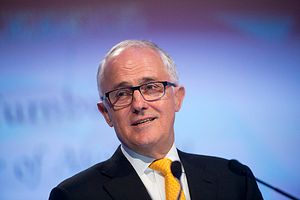Relations between Australia and China have become increasingly strained recently.
On December 14, the Chinese foreign ministry admitted that it had summoned Jan Adams — the Australian ambassador to China — recently for “an important talk” with a top Chinese official.
Chinese foreign ministry spokesperson Lu Kang emphasized at the regular press briefing that “Australia should be very clear about China’s position on the relevant issue of our bilateral relations.”
Although he did not clarify what the “relevant issue” exactly is, the Australian media has unanimously pointed out that the call-in was triggered by the Turnbull government’s new foreign interference laws.
On December 5, Australian Prime Minister Malcolm Turnbull announced a series of new laws to prevent political interference from foreign countries.
According to BBC, these proposed laws, which still need parliamentary approval, will include a ban on foreign donations in Australian political campaigns, a transparency register for those acting on behalf of foreign governments, and other new criminal offenses that clamp down on espionage and trading secrets.
“Foreign powers are making unprecedented and increasingly sophisticated attempts to influence the political process, both here and abroad,” Turnbull explained. “We must ensure that our politics and our Parliament are strong enough to withstand attempts by foreign powers to interfere or influence.”
Turnbull didn’t single China out during this speech, but the spat over China’s alleged interference in Australian politics has gone back and forth between Beijing and Canberra for a while.
In recent months, multiple disputes broke out between Chinese international students and their Australian universities, as the students complained about their professors using teaching materials that are incorrect or insulting to China. These disputes gradually developed into Australian media criticism of Chinese interference on Australian campuses.
Australian media then began reporting on Chinese attempts to influence politics, after Australia’s major political parties were found to have accepted donations from Chinese businessmen.
However, the Chinese government fiercely denied any involvement in these incidents and strongly blamed Australian media for being biased toward China.
On December 8, Chinese foreign ministry spokesperson Geng Shuang sharply criticized Turnbull without mentioning his name. He said:
We are shocked by the Australian leader’s remarks, which are lack of principle [sic] and simply pander to those irresponsible reports by some Australian media. Imbued with bias towards China, these groundless and unfounded remarks can sabotage China-Australia relations and are detrimental to the foundation of mutual trust and cooperation. We are strongly dissatisfied with those remarks and [the ministry] has lodged stern representations with the Australian side.
Geng further “strongly” urged “the relevant people in Australia” to “shake off their Cold War mentality and bias against China, immediately stop uttering false remarks that undermine political mutual trust and mutually beneficial cooperation, and take effective measures to offset negative effects so as to avoid disrupting and impacting the development of China-Australia relations.”
Beijing’s strong remarks immediately provoked an unusual counterattack from Turnbull. Rejecting China’s criticism, he even used Mandarin to declare he will “stand up“ for Australian sovereignty.
”Modern China was founded in 1949 with these words, ‘The Chinese people have stood up.’ It was an assertion of sovereignty, it was an assertion of pride,” he stressed. ”And we stand up and so we say, the Australian people stand up.”
In response, Lu Kang “advised” Turnbull on December 11 to “refrain from those remarks that are detrimental to their own images and China-Australia relations.“

































